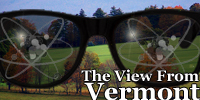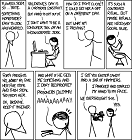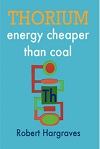Prisoner’s Dilemma and New Types of Nuclear Reactors
 Prisoner's Dilemma is a famous example of game theory. You can look at this example in quite a few ways. I especially think of this game when I am thinking about Liquid Fluoride Thorium Reactors (LFTRs) and advanced and non-traditional reactor development.
Prisoner's Dilemma is a famous example of game theory. You can look at this example in quite a few ways. I especially think of this game when I am thinking about Liquid Fluoride Thorium Reactors (LFTRs) and advanced and non-traditional reactor development.
But before I begin looking at LFTRs, let's see the classic example of the game.
Prisoner's Dilemma, summarized
 Two men are arrested. They are held separately and cannot communicate with each other. Prisoner A is told that if he gives evidence against Prisoner B, while Prisoner B does not give evidence against Prisoner A, Prisoner A will go scot-free and Prisoner B will spend three years in prison (and vice-versa). If A gives evidence against B, but B also gives evidence against A, they will both spend two years in prison. If neither A nor B gives evidence against the other, they will both spend only one year in prison.
Two men are arrested. They are held separately and cannot communicate with each other. Prisoner A is told that if he gives evidence against Prisoner B, while Prisoner B does not give evidence against Prisoner A, Prisoner A will go scot-free and Prisoner B will spend three years in prison (and vice-versa). If A gives evidence against B, but B also gives evidence against A, they will both spend two years in prison. If neither A nor B gives evidence against the other, they will both spend only one year in prison.
In other words: If you give evidence against the other guy, you get a good deal, unless the other guy gives evidence against you.
The best deal overall is for nobody to give evidence against the other person: this leads to 1 year in prison for both people. However, this decision puts the individual in a difficult position. He fears that if he does not give evidence, but the other person does, then he will get three years in prison for having kept silent. The best outcome is for both people NOT to give evidence, but the most probable outcome is that most people WILL give evidence.
The most probable outcome is two years in prison for both.
Viewpoints on the game
This game can be looked at as simple strategy: Here are the rules, and therefore these results will be the consequences of those rules.
The game can also be looked at as a moral issue: Taking the high road (not attacking the other guy) leads to the best overall outcome.
Or a community issue: How can you persuade people to do what is best for the group, instead of what is best for themselves (and not-best for the group)?
Or a truth and falsehood issue: As a friend pointed out to me recently, the people judging the prisoners sound like very crooked people. There is nothing in this game to say that the evidence given is true or false, or that the prisoners are guilty or not guilty. If one person "gives evidence," it convicts the other person. End of story.
 Or a communications issue: If the two prisoners could talk to each other, they could mutually decide to not-attack the other and get the best overall outcome. Most versions of Prisoners Dilemma make it clear that if the players are able to talk to each other, it is fundamentally not the same game.
Or a communications issue: If the two prisoners could talk to each other, they could mutually decide to not-attack the other and get the best overall outcome. Most versions of Prisoners Dilemma make it clear that if the players are able to talk to each other, it is fundamentally not the same game.
Okay. Let's get back to communicating about nuclear energy.
LFTRs and the Dilemma
I am happy to know several proponents of LFTR development. Chief among these people is Dr. Robert Hargraves, who wrote the book THORIUM, Energy Cheaper Than Coal, and has spoken on the subject worldwide.
 I am also a strong proponent of LFTR development. I presented LFTRs years ago in a poster session at a high temperature chemistry Gordon Conference.
I am also a strong proponent of LFTR development. I presented LFTRs years ago in a poster session at a high temperature chemistry Gordon Conference.
Hargraves finds it straightforward to be in favor of continued operation of currently operating LWR like the Vermont Yankee nuclear plant AND in favor of rapid development of LFTRs. I feel the same.
With the people I know, there is no dilemma, because there is no real contradiction between two goals:
- Keeping current reactors contributing to our electricity supply.
- Designing new types of reactors for the future.
But there is a dilemma
Not everyone is mellow all the time.
The people who want to see new types of reactors funded sometimes attack current reactors vigorously: You NEED our reactors for safety and non-proliferation!
People who work on current reactors sometimes attack new types of reactors as impractical: Your idea is just one step beyond a PAPER REACTOR and will be full of new problems when you scale it up!
To some extent, we are having the classic Prisoner's Dilemma outcome: Both sides are attacking. The attacks lead to a worse result for everyone.
Communication as the answer
Supposedly, the fact that both sides can communicate with each other should change the game. The game shouldn't even be Prisoner's Dilemma anymore. We can learn by communicating.
For example, attacks on current reactors will translate easily into attacks on new types of reactors. Therefore, supporters of new types of reactors should not join the nuclear opponent attacks on operating reactors.
Similarly, no one should dismiss other reactor designs so vigorously that the implication becomes that operating reactors are the best reactors that could ever be designed or built. Engineering advances have improved cars, houses, television sets, and computers. Engineering advances will improve reactors.
In other words, both sides will win if we promote nuclear power as a whole.
Yet, like the prisoners who can't communicate, we are afraid of the downside. We fear that new reactor types won't get funding, or we are afraid that existing reactors will be shut down. Sometimes we can't see that attacks on the "other" nuclear technology hurt the whole community of nuclear supporters.
But there is a way to win. The way to "beat" Prisoners Dilemma, the acknowledged way to change the game, is to communicate.
Let's start communicating.
____________________________
Endnote: I wrote about communication, but I think that the other issues I listed (moral, community, truth and falsehood) also come into play. I welcome your comments. Is the nuclear industry playing "Prisoners Dilemma"? And if we are playing, how do we stop?
I also recommend Rod Adams' post Open letter to advocates of Generation IV reactors (IFR, LFTR, NGNP, PBHTR) in which he reminds us that the real battle is "fission versus fire", not "types of fission." The post also has a lengthy and very interesting comment stream.
____________________________

Angwin
Meredith Angwin is the founder of Carnot Communications, which helps firms to communicate technical matters. She specialized in mineral chemistry as a graduate student at the University of Chicago. Later, she became a project manager in the geothermal group at the Electric Power Research Institute (EPRI). Then she moved to nuclear energy, becoming a project manager in the EPRI nuclear division. She is an inventor on several patents.
Angwin formerly served as a commissioner in Hartford Energy Commission, Hartford, Vt. Angwin is a long-time member of the American Nuclear Society and coordinator of the Energy Education Project. She is a frequent contributor to the ANS Nuclear Cafe.





